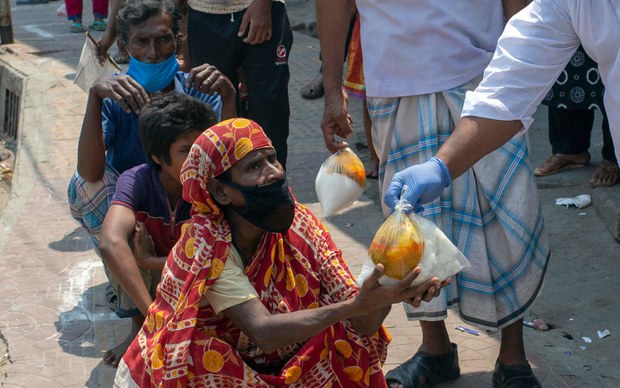NGO: Millions in Bangladesh Lack Food Due to COVID-19 Lockdowns
2020.04.10
Dhaka
 Bangladeshis affected by the economic downturn caused by the COVID-19 pandemic receive food from a private organization in Dhaka, April 7, 2020.
Bangladeshis affected by the economic downturn caused by the COVID-19 pandemic receive food from a private organization in Dhaka, April 7, 2020.
Millions of low-income people in Bangladesh lack food and have been hit hard economically because of social distancing enforcement and lockdowns imposed as public safeguards against the coronavirus pandemic, the country’s largest NGO said in a report released Friday.
As a result, 14 percent of the country’s poor have no food, according to a survey published by the Bangladesh Rural Advancement Committee. Before the viral outbreak, the average monthly household income of the 2,675 respondents was 14,599 taka (U.S. $172) but it has since fallen to 3,742 taka ($42), BRAC said.
“Low income people of the country are suffering great losses in their earnings since the enforcement of social distancing measures and lockdowns to fight Novel Coronavirus,” the NGO reported.
“Food assistance must be immediately [delivered] to the millions of households across the country suffering from acute food shortage,” BRAC recommended. “Special attention is needed to keep the agricultural value chain from stalling.
“People who have returned to their home villages from cities are not enrolled in any social safety net programs “and so need proper delivery mechanisms to get food aid immediately,” the NGO warned.
When asked to comment on the report, the country’s planning minister said that food programs were available for those in need.
“Certainly there is a crisis as those who used to live hand-to-mouth have no work now. But many of them will fall under the social safety net,” Minister M.A. Mannan told BenarNews late Friday.
Enamur Rahman, the state minister for disaster management, said the government had considered a possible food crisis before declaring a “general holiday” in late March in an effort to slow the spread of COVID-19.
The government has the capacity to provide food to those in need for the next three months without interruption, he said.
“As a result, so far 65,900 metric tons of rice have been allocated countrywide,” the state minister told BenarNews.
He also said 3.14 million taka (U.S. $369,000) had been allocated to meet food demand for children.
“We have not received any such report yet that someone has no food at home,” Enamur Rahman said.
BRAC released the findings of its survey six days after Prime Minister Sheikh Hasina announced that her government was expanding a stimulus program to $8.5 billion to help the nation’s economy recover from massive knock-on effects brought on by the pandemic.
Much of the package is aimed at helping businesses and sectors, particularly the export-oriented garment industries, which has lost billions of dollars through contracts cancelled by foreign buyers and which has caused some 2 million employees to lose their jobs or be furloughed, according to a leading trade group.
But a portion of the package that Hasina unveiled on April 6 included expanding social safety-net programs to help people living below the poverty line meet their basic necessities, the prime minister said. The government would also distribute free food – particularly to the poor and elderly – and help them buy rice at a subsidized price, she said.
Mustafizur Rahman, an economist with the Center for Policy Dialogue (CPD), a local think tank, said there had been millions of day laborers and self-employed workers in Bangladesh.
“Around 40 million people who survive either through day labor or doing small businesses and are not getting monthly salaries and were not in extreme poverty when they were working,” he told BenarNews. “Many of them went below the poverty level as their incomes came to a halt because of the coronavirus.”
In his opinion, the government needs to ensure food for those in need and expand safety-net programs in rural areas.
“Those who were not under the programs will have to be brought under the net now,” Rahman said.
He called for coordination between the public and private sectors to introduce a rationing system and expand the distribution network.
Awareness campaigns
In its news release regarding the survey, BRAC recommended focusing large-scale awareness campaigns on prevention, management and treatment of the coronavirus to run on TV and social media.
The survey found nearly all respondents – 99.6 percent – had heard about COVID-19 and two-thirds first heard about it on television. Still, many did not know how to combat the pandemic as only 40 percent mentioned isolation/quarantine as a treatment option and 9 percent had no idea what to do if someone contracted the coronavirus.
BRAC also found that more than one in three people did not have a clear idea of the steps needed to prevent COVID-19.
“Most people do not have any idea about the message that one should not directly go to any health facility with symptoms of the infection (fever, cough, breathing problem), 53 percent of respondents said they would suggest neighbors with these symptoms go to an urban hospital or a public health care center. Only 29 percent said they would ask the patient to call a helpline.”
On Friday, Bangladesh health authorities reported 424 COVID-19 cases and 27 deaths, an increase of 94 and six from the day before.
At least 1.6 million people have been infected by the coronavirus across the world and more than 101,000 have died, according to the latest data compiled by disease experts at Johns Hopkins University in the United States.







